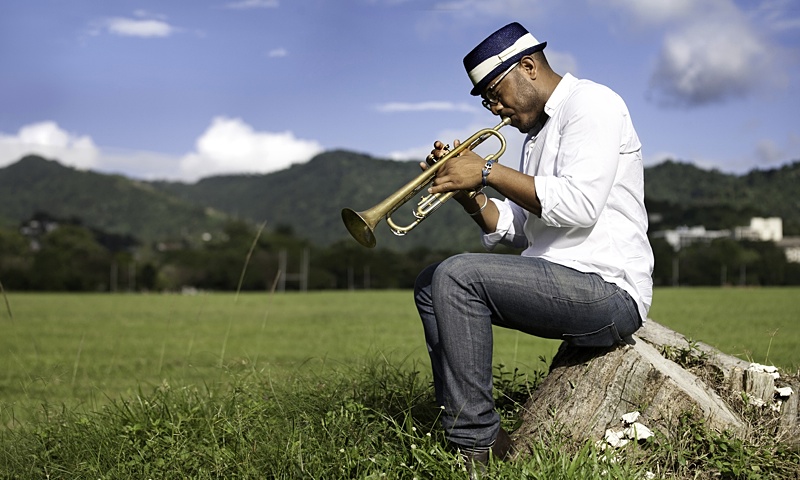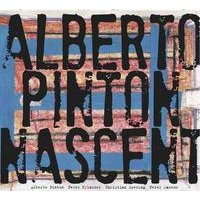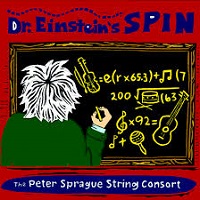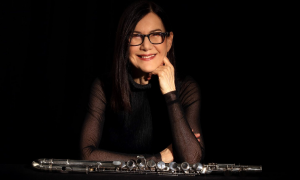Home » Jazz Articles » Interview » Etienne Charles: Trumpet's First Chantwell
Etienne Charles: Trumpet's First Chantwell

Etienne Charles comes from a strong lineage of musicians that can be traced to his great grandfather, who played banjo and violin. His grandfather, Ralph Charles, was a cuatro player who recorded with the calypsonian Growling Tiger. Both his father and uncle were members of the steel orchestra Phase II Pan Groove, which won national Panorama competitions back-to-back in 1987 and '88. By the time he was 10, the young Charles would also join Phase II.
As a sideman, Charles has recorded or performed alongside

Monty Alexander
pianob.1944

Wynton Marsalis
trumpetb.1961

Marcus Roberts
pianob.1963

Maria Schneider
composer / conductor
Count Basie
piano1904 - 1984
Another luminary musical figure that helped Charles come up as a musician was the late percussionist Ralph McDonald, who he honors with a song made famous by The Mighty Sparrow, "Memories."
"He was a special spirit and I'm very lucky to [have] been around him as much as I was in the last five or six years of his life," remembers Charles. "He showed me so much about playing music and he brought me to his house. Every time there was a family get-together he would invite me over and there was always food. He was that mentor that shows you how life is supposed to be outside of music and how music is supposed to be a part of your life. He definitely helped me a lot. He was on all my previous records [except] this one because he passed away before we recorded. The session for me was uniquely emotional because you knew something had come to an end. But out of it, something had come of age."
While the Great American Songbook has been a huge staple for the idiom, it is also not uncommon for musicians to include songs outside of the genre. But Charles has the unique challenge of having a repertoire that does not have its roots in the United States. The

Robert Glasper
pianob.1978

The Bad Plus
band / ensemble / orchestrab.2000

Brad Mehldau
pianob.1970

George Gershwin
composer / conductor1898 - 1937
But not all music with from the Caribbean islands is lost to the public. "I've been pleasantly surprised that a lot of people know Lord Kitchener's music," Charles continues. "They know Mighty Sparrow's music, and they know Lord Melody's music because of his association with

Harry Belafonte
vocals1927 - 2023

Bob Marley
guitar1945 - 1981
"We just play and that's our job as musicians, to advocate for these composers that have passed away and keep their music alive," continues Charles. "Be it

Duke Ellington
piano1899 - 1974
 With Creole Soul, Charles advocates composers from Bob Marley,
With Creole Soul, Charles advocates composers from Bob Marley, 
Thelonious Monk
piano1917 - 1982
Creole Soul is also about a return to composition for Charles. "I hadn't written music since Folklore (Self Produced, 2009), so I was like 'OK, time to write some music,'" says Charles. "It's a direct reflection of what I've been listening to. I've been listening to a lot of French Caribbean music, a lot of music from Martinique, and Haitian music."
For songs like "Turn Your Lights Down Low," "Green Chimneys," "You Don't Love Me" and "Memories," Charles says that he wanted to "accentuate the idea of mixed cultures."
"The music is about being of a mixed culture or mixed heritage," Charles reveals. "It's about the many many things that make us who we are."
One facet that makes Charles who he is and defines his music is dancing. Music and dance always go together. There are still a few who remember when swing was also considered a dance and not just the sound of

Elvin Jones
drums1927 - 2004
"I always encourage people if they feel like dancing to get up and dance. I'm not one of those people who [will] get offended if you decide to shout and make some noise. I'm always encouraging them; to me, the most fun I have is when people actually get up and dance. Because it's an exchange of energy, we're playing and they're dancing, and we're going back and forth."
"But it's a challenge, and specifically our goal is to make people tap their toes, bounce their heads, and snap their fingers, shake their butts, and get up and move. That's our purpose, that's what we come out to do. Be it swing, calypso, reggae, funk, everything we play we try to make as deep in the groove as possible so that people feel the urge to get up and bounce. The bounce to me is everything in music. For me, it's about dancing—especially Caribbean music, it's about making that booty shake."
Charles' rendition of Thelonious Monk's "Green Chimneys" is one example of the bounce he commands. A bounce that is closely related to what

Jelly Roll Morton
piano1890 - 1941
"With 'Green Chimneys' it's almost like a habanera type rhythm, which is common sense based on where Monk grew up in San Juan Hill," comments Charles. "He must have [heard] calypso music. Caribbean music and New Orleans is all about beat four, [so] I connected the bass line and the melody on beat four to help accentuate that. A lot of people play 'Green Chimneys' as a second line beat. But we did it with a calypso beat instead of second line."
Charles' conviction about the bounce and dancing go so deep that he also shares it to his students at Michigan State University where he is an Assistant Professor of Jazz Studies. "I was teaching this camp at Michigan State," recalls Charles. "I was conducting one of the big bands at the camp. I do this also with my university students—I teach them how to dance to the music. I will put the original recording on and I will make them dance. Why? If you don't know how to dance, you don't know how to make somebody dance. If you don't know how to dance, there's no way you know why that person wrote [the] music to connect to the bounce—if it's dance music."
 "If you're talking about
"If you're talking about 
Count Basie
piano1904 - 1984

Duke Ellington
piano1899 - 1974

The Meters
band / ensemble / orchestraMusicians that are featured on Creole Soul that help him achieve his bounce are tenor saxophonist

Jacques Schwarz-Bart
saxophone, tenor
Brian Hogans
saxophone, altob.1982

Alex Wintz
guitar
Kris Bowers
keyboardsb.1989

Ben Williams
bass, electric
Obed Calvaire
drums
Daniel Sadownick
percussion"I wrote the music with these musicians specifically in mind," says Charles. "Because I've been playing with them for so many years, I know that these are the things that would feature them well and these are the things that they would naturally add on to. On 'Creole,' a Haitian tune—Obed's Haitian! So that was right up his alley. I told him that I wanted that Haitian thing and he was like 'Yeah, yeah, yeah!' and it was natural! Then you have

Kris Bowers
keyboardsb.1989

Alex Wintz
guitar
Jacques Schwarz-Bart
saxophone, tenor
Ben Williams
bass, electric"I heard Alex on

Brian Hogans
saxophone, altob.1982
Though Charles is a trumpeter, he is also proficient in playing cuatro and the steel pan. On, Folklore, Charles composed the music on cuatro and steel pan. For the new album, he wrote all the tunes sitting behind the piano except for "Doin' the Thing," which is a tribute to trumpeter

Blue Mitchell
trumpet1930 - 1979
"I always think about call-and-response when I write, because it makes the music conversational," says Charles. "It's engrained in me as a musician and composer who is coming out of the African Diaspora and the Caribbean. It's engrained in me that music must have call-and-response. It's one of the defining characteristics of jazz. It's definitely one of the defining characteristics of African Diaspora music or black music.
"With the first track, 'Creole,' the first thing I wrote was the lavway. Lavway means the hook or the theme. It's a word we use in Trinidad to refer to as the chorus or the theme. An example of a lavway would be

Michael Jackson
vocals1958 - 2009
"During improvisation call and response happens naturally, but when I write I try to make sure I put it in. In the large scheme of the tune the call and response goes from Eb minor to Gb major. So it goes from dark to light. Basically, that's the call-and- response."
"I definitely think call and response is one of my [most] important parts of my writing. I looked at Thelonious Monk, and he's all about call-and-response. I listened to

Horace Silver
piano1928 - 2014

Freddie Hubbard
trumpet1938 - 2008

Nat Adderley
trumpet1931 - 2000

David Sanchez
saxophone, tenorb.1968
But Creole Soul isn't just limited to Caribbean traditions, Etienne Charles also shows that he is adept to modern compositional tools as well. "I wrote the bass line for 'The Folks' with a twelve-tone row," explains Charles. "I kind of hid in a way that makes it normal to hear. I wrote it from three formal patterns C, G, B, Eb, then Ab, Bb, Db, F, and then F#, E, A, B. So it's three sets of tones of four that don't repeat themselves. Then I put chords to it that would naturally work harmonically so they completely conceal the fact that the bass line is [based] from a twelve-tone row. That's basically a conversation between two people—my parents. The way the melody works, they move parallel, then contrary, then they move parallel again. It's about how two people move and live together."
Selected Discography
Etienne Charles, Creole Soul (Culture Shock, 2013)
Etienne Charles, Kaiso (Culture Shock, 2011)
Etienne Charles, Folklore (Self Produced, 2009)

Scotty Barnhart
trumpetb.1964

Cynthia Scott
vocalsRalph McDonald, Mixty Motions (CDBY, 2008)
Etienne Charles, Culture Shock (Self Produced, 2006).
Photo Credit
Courtesy of

Etienne Charles
trumpetb.1983
Tags
Etienne Charles
Interview
DanMichael Reyes
United States
Monty Alexander
wynton marsalis
Marcus Roberts
Maria Schneider
Count Basie
Robert Glasper
The Bad Plus
brad mehldau
George Gershwin
Harry Belafonte
bob marley
duke ellington
Thelonious Monk
Elvin Jones
Jelly Roll Morton
The Meters
Jacques Schwarz-Bart
Brian Hogans
Alex Wintz
Kris Bowers
Ben Williams
Obed Calvaire
Daniel Sadownick
Blue Mitchell
Michael Jackson
Horace Silver
Freddie Hubbard
Nat Adderley
David Sanchez
Scotty Barnhart
Cynthia Scott
Comments
PREVIOUS / NEXT
Etienne Charles Concerts
Sep
18
Thu

Etienne Charles & Creole Soul
Wexner Center for the ArtsColumbus, OH
Sep
18
Thu

Etienne Charles & Creole Soul
Wexner Center for the ArtsColumbus, OH
Jun
5
Fri

Etienne Charles
The Appel RoomNew York, NY
Jun
6
Sat

Etienne Charles
The Appel RoomNew York, NY
Support All About Jazz
 All About Jazz has been a pillar of jazz since 1995, championing it as an art form and, more importantly, supporting the musicians who make it. Our enduring commitment has made "AAJ" one of the most culturally important websites of its kind, read by hundreds of thousands of fans, musicians and industry figures every month.
All About Jazz has been a pillar of jazz since 1995, championing it as an art form and, more importantly, supporting the musicians who make it. Our enduring commitment has made "AAJ" one of the most culturally important websites of its kind, read by hundreds of thousands of fans, musicians and industry figures every month.

.jpg)



 Buy Now
Buy Now























